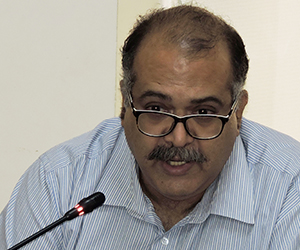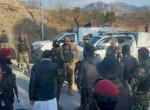The highly provocative, extremely offensive, and utterly reprehensible resolution passed by the National Assembly of Pakistan condemning Indian ‘state sponsored brutalities’ and demanding the handing over the body of executed terrorist Afzal Guru to his family, allowing people to freely practise their religion (this coming from a state where an open season has been declared on Shias, Hindu girls are abducted and forcibly converted and Christians are subjected to the worst sort of Islamofascism), pulling out of security forces from Kashmir and repealing all ‘black laws’ in the Indian state, release of all ‘political prisoners’, implementation of the UN Security Council resolutions, and promising political, moral and diplomatic support to the Kashmiris, has predictably enough raised the hackles in India.
While on the one hand the resolution has given an indication of the direction in which things are likely to move as far as Pakistan's export of terrorism in Kashmir is concerned, on the other hand it has exposed all the manufactured bonhomie and double-talk being indulged by the Pakistani politicians who tried to beguile Indian policy makers into believing that there was a political consensus in Pakistan in favour of normalisation of relations with India. Since around 1997, India has been sold the nonsense that neither Kashmir nor India is any longer an issue in Pakistani elections. The real reason why India and Kashmir didn’t figure as an election issue was that there was a broad based political consensus in Pakistan in favour of exporting jihad and delivering a ‘death by a thousand cuts’ to India. Since no one opposed this policy there was no gain to be made by raking this issue at the hustings.
Over the last few years, however, an impression had gained ground that the political consensus inside Pakistan in favour of export of jihad was breaking down. Not surprisingly, some political players smelled an opportunity to agitate on this issue to increase their vote bank. But the moment one player tries to exploit this issue, all others start falling over each other to swear their commitment to snatching Kashmir from India. The unanimous passage of this resolution bears out that no one in Pakistan is willing to question, much less stand up against, the Jihadist policy of the State. What this does to the policy of appeasement towards Pakistan being followed by the Manmohan Singh government and to the expressed desire of the Indian Prime Minister who had declared that he would think he had done his job well if he managed to normalise relations with Pakistan can well be imagined.
Apologists for Pakistan in India will of course argue that too much should not be read into this resolution which has been made for purely political reasons by legislators who are about to go in for fresh elections. After all, notwithstanding all the hyperbole of this National Assembly having made the ‘historic achievement’ of completing it term, the fact remains that in many ways it was an effete and powerless collection of people whose resolutions were not worth the paper they were written on because these resolutions were observed more in their violation. What is more, these ‘elected representatives’ of the people of Pakistan are perhaps the meekest and weakest part of the Pakistani state and are treated with contempt by the overbearing judiciary, meddling military and self-righteous media. And yet, this is a resolution that cannot and should not be ignored, both because it reflects the unremitting hostility towards India of the political class in Pakistan, as well as for what this resolution portends in terms of another upsurge in export of jihadi terrorism to India.
To the extent that this resolution is a mea culpa on part of the Pakistani state for its involvement in the dastardly attack on the Indian Parliament, it needs to be welcomed. Pakistan, it seems, has finally officially taken ownership of Afzal Guru and his terrorist action and accepted that he was a Pakistani agent working at the behest of his Pakistani masters to attack the Indian Parliament. The resolution is a tacit acknowledgement of Guru’s links with the Jaish-e-Mohammed, one of the terrorist outfits involved in the Parliament attack. The mover of the resolution, Maulana Fazlur Rehman (better known as Maulana Diesel for his involvement in Diesel smuggling) is a Deobandi cleric who shares fraternal links with Deobandi terror groups like the JeM, Harkatul Mujahideen, Sipah-e-Sahaba, not to mention the Tehrik-e-Taliban Pakistan (TTP). Rehman also happens to be the Chairman of the Kashmir Committee of the Pakistani Parliament, which is basically an organisation for providing foreign junkets to Pakistani politicians at the expense of the bankrupt government of Pakistan.
The Maulana, who also happens to be leading an effort to effect a rapprochement between the Pakistani authorities and the TTP, probably intends to use this resolution not only to cement his credentials as a dyed-in-wool jihadist who stands firm on the so-called ‘Kashmir cause’, but also to appease terror groups like TTP which have been threatening retaliation against India for the hanging of Ajmal Kasab and Afzal Guru. The same Maulana had in 2001-02 issued a fatwa calling for the murder of Americans and the notoriety as well as popularity he gained catapulted him to the position of Leader of Opposition (he was actually more of a lap dog of the Pakistani military dictator Pervez Musharraf) in the National Assembly that came into existence after the 2002 elections. The Maulana’s party, Jamiat Ulema Islam (JUI-F) also formed governments in the province of Khyber Pakhtunkhwa and Balochistan, which were used to promote Talibanisation in both these provinces.
Perhaps, a similar game is once again being played by Maulana Fazlur Rehman, only this time it isn’t the US but India which is being targeted. In the process, the Maulana, who has been a frequent visitor to India where he has tried to convince his Indian interlocutors of his bonafides and his intense and sincere desire to play a role in improving Indo-Pak relations, has more or less burnt his bridges with India. He is unlikely to be welcome anymore in this country. He has only proved his detractors, who pointed to the undesirable company he kept and his links with extremist and terrorist groups, right. For the sake of playing to the gallery back home in the hope of winning some brownie points and perhaps a few extra votes, he has effectively become a persona non grata in India.
But if people like Fazlur Rehman are becoming an anathema for India, their acceptability is growing among the Americans. If anything, the Americans seem to have given a free hand to Pakistani Islamists as part of their plan to exit from the region. Just recently, the US Ambassador to Islamabad held a meeting with Maulana Fazlur Rehman. Subsequently, the US envoy told the Pakistani media that the situation in Terror Central (North Waziristan) was something that Pakistan had to sort out domestically, thereby indicating that the US was willing to turn a blind eye to a terrorist safe haven in return for Maulana Fazlur Rehman using his influence and contacts to push forward with the ‘reconciliation process’ in Afghanistan. Worse, with two utterly clueless apologists for Pakistan now at the helm of affairs at the State Department and Pentagon, the US policy on Islamist terrorism is likely to undergo a major transformation with appeasement of Pakistan and turning a blind eye to its use of terrorism as an instrument of state policy becoming the order of the day as a quid pro quo for safe passage out of Afghanistan for Western troops. The result is an emboldening of Pakistan, and its natural corollary is the political and military adventurism that is being seen on Kashmir and the recent acts of terrorism in other parts of India.
India cannot afford to let this challenge to go unanswered. Not only does India need to disabuse the Pakistanis and the Americans of the notion that they can trifle with India for their own ends, but more importantly, the political class in India, especially the Manmohanistas need to disabuse themselves of the notion that Pakistan is genuinely interested in normalisation of relations with India. Instead of formulating policy on the basis of the sweet-talk coming from Pakistani politicians who neither control any wing of the ISI nor command a single division of the Pakistan army (comprising of jihadis, some in uniform, others in mufti), India would be better served by seeing action on the ground by the Pakistanis to prove their bonafides. The unanimous resolution passed by the Lok Sabha is the first right step in this direction. This needs to be followed up by setting metrics on the basis of which Pakistan’s intentions will be judged. Equally important, India needs to stop giving the unnecessary and unwarranted importance to the mythical Pakistani civil society which is nothing more than a powerless, if also vocal, fringe group comprising around 500 (and if you want to be very charitable, 5000) people. Most of all, India needs to stop depending on the US for pulling its chestnuts out of the fire. The US will do what is in its interest and if this means sacrificing India’s interests, then so be it. India, therefore, needs to prepare itself for the coming wave of terrorism and develop capabilities to counter this scourge as well as pay back the adversary in more than equal measure.
Published Date: 16th March 2013











Post new comment